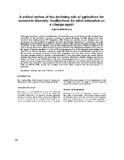A critical review of the declining role of agriculture for economic diversity: implications for adult education as a change agent

View/
Date
2009-11Author
Raditloaneng, W.
Publisher
Academic Journals, http://www.academicjournals.orgType
Published ArticleMetadata
Show full item recordAbstract
This paper provides a critique of globalization with a special focus on the declining role of subsistence agriculture as the backbone of peasant economy in colonial Botswana and the changes that have occurred since independence 30th September 1966. During the colonial and pre independence era, agriculture was the backbone of peasant economy and poverty eradication in Botswana. The post independence era in Botswana resulted in reforms in all the public sectors including education, health, agriculture, tourism, trade, industry, science and communication and others which are typified in the cash economy. Based on a mixed methodology of qualitative and participatory activities in the study of the impact of learned identities of a total of 30 poor people poverty in two selected communities (one rural and one urban) in Botswana, this paper argues that with the advent of globalization, agriculture as the backbone of peasant economy is faced with competition from the other sectors of the modern economy. Despite efforts to engage in diversification of the agricultural sector and harsh climatic changes and human factors, the sector has been adversely affected by climatic changes and human factors too. Based on the deliberation of the poor who participated in the study; to be the backbone of peasant economy and poverty eradication. Registered destitutes who participated in this study had not graduated form poverty to non- poverty at the time of the qualitative study conducted between August 2008 and March 2009, despite the monthly food basket they received from the Government of Botswana.
